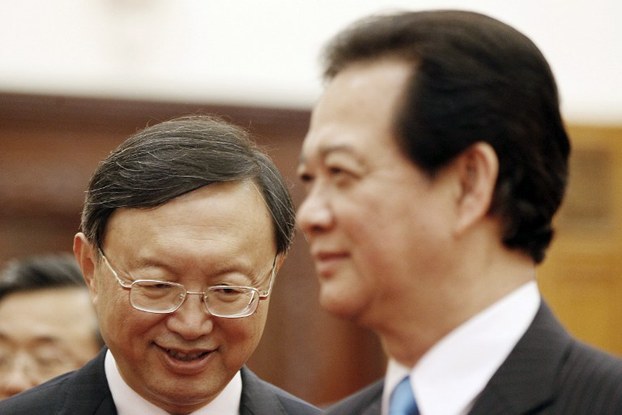




Beijing and Hanoi reached an impasse in talks Wednesday over their latest territorial spat, as China’s top diplomat Yang Jiechi warned Vietnam against disrupting the deployment of a controversial oil rig and Vietnam’s Prime Minister Nguyen Tan Dung urged its giant neighbor to withdraw the equipment.
Tensions have spiraled since May 2 when a Chinese state-run oil company deployed the rig near Vietnam’s coast. Many had expected the visit to Hanoi by State Councilor Yang, who ranks higher than China’s Foreign Minister, to ease the strain.
But the language used by the state media of both countries indicated that the crisis would linger on.
Yang first met with Vietnamese Foreign Minister Pham Binh Minh Wednesday and accused Hanoi of stoking the confrontation in the South China Sea waters that both countries claim to be within their sovereign territory, and where ships from both nations have faced off in recent weeks.
Yang said Vietnam should “stop disruptions against China's normal operations” of the rig deployed near the Paracel islands—which are occupied by China and claimed by Hanoi—and “refrain from creating fresh disputes,” China’s official Xinhua news agency reported.
“Yang stressed the Xisha [Paracel] Islands are inherent territory of China and there are no disputes in this area,” the report said.
The Paracel Islands, known as Hoang Sa in Vietnamese, were seized by China from then-South Vietnam in 1974 in a period of turmoil shortly before the end of the Vietnam war.
Vietnam earlier this month released dramatic video footage showing a large Chinese ship chasing and ramming one of its fishing boats near the rig and causing it to sink.
Yang also received an earful in talks with Vietnamese Prime Minister Nguyen Tan Dung, who asked Beijing to pull back the oil rig from the disputed waters.
Dung said the rig deployment “seriously violates Vietnam’s sovereignty,” according to Hanoi’s official Thanh Nien newspaper, and that Vietnam would “resolutely struggle to defend its sovereignty” by peaceful means in line with international law.
“China’s act also threatens peace, stability, security and safety of navigation and aviation in the region, while causing indignation and hurting the sentiments of Vietnamese people, putting negative impacts on the cooperation between the two Parties and countries,” the report quoted Dung as saying.
Dung said China’s action was also in violation of the agreements reached between leaders of both countries and infringed on the 1982 United Nations Conventions on the Law of the Sea, which rejects historically based claims.
Thanh Nien said that Dung requested China “withdraw its rig and ships from Vietnam’s waters and join talks for the settlement of disputes and differences between the two countries by peaceful measures in accordance with international law and the common perception of the two countries’ leaders.”
Dung said that the two sides should control the situation to prevent conflicts while maintaining contact and talks to solve the current disputes.
Xinhua said that Yang had also called on the two countries to “manage their maritime situation, maintain bilateral communication and solve their disagreements over maritime issues properly through political and diplomatic efforts.”
The Associated Press cited a Vietnamese official familiar with the talks as saying that no progress was made during the discussion between Yang and Minh as the two sides “insisted on their opposing positions.”
Expert weighs in
Meanwhile, a Chinese expert on Wednesday called on Hanoi to fulfill its legal obligation spelled out in a diplomatic document which he claimed recognized the Paracel and Spratly islands in the South China Sea as belonging to Beijing.
In an article published in the official China Daily, Wu Yuanfu, director of the Research Institute of Vietnamese Law with Guangxi University for Nationalities, said that Vietnam “has no legal basis to back up its disruptive and dangerous activities” over the deployment of the rig.
Wu noted that in 1958, then-Prime Minister of the Democratic Republic of Vietnam Pham Van Dong sent a letter “recognizing and endorsing” China’s claims to the islands and pledging “complete respect” to Beijing’s maritime sovereignty in bilateral state-to-state ties.
He said that Vietnam had changed its stance only after its south-north unification in 1975 “and ever since it has made every effort to misinterpret and deny the official stance embodied in Pham's note.”
“According to relevant international laws, practices and norms, Pham's note to China belongs to a unilateral national statement that can produce a legal obligation and thus the Vietnamese government is obliged to undertake that obligation,” Wu said.
Shaky relations
Tensions over the South China Sea dispute have lowered relations between China and Vietnam to their worst since the two communist nations fought a brief border war in 1979.
The rig’s deployment set off violent anti-Chinese riots in Vietnam last month, leaving at least four people dead and resulting in the destruction of factories believed to be operated by Chinese companies, though many were Taiwanese-owned.
Prime Minister Dung last month threatened to take legal action against China for the rig deployment.
China claims almost the entire South China Sea, rejecting rival claims from Vietnam, the Philippines, Taiwan, Malaysia, and Brunei.